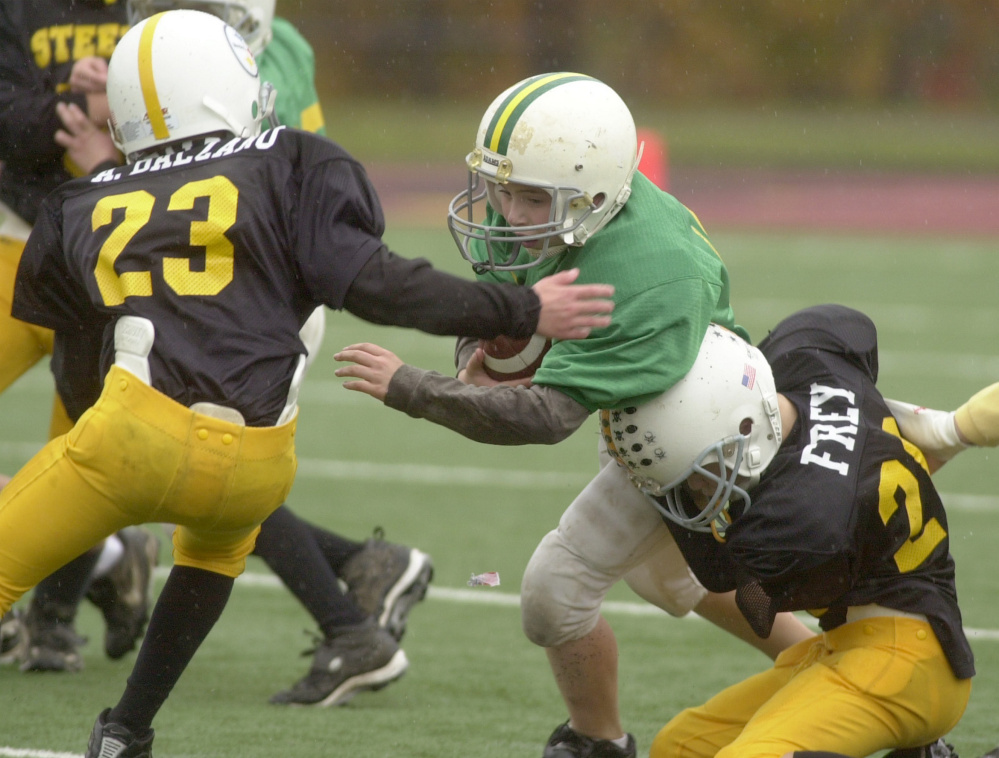A new study suggests that children who play tackle football before age 12 are at greater risk of depression and cognitive difficulties as adults than those who take up the sport later.
The research, conducted by Boston University’s Chronic Traumatic Encephalopathy Center, shows that youth football players double their risk of developing mood and behavioral problems and triple their chances of suffering depression as adults. They are also at greater risk of having difficulty with problem-solving and organizing as they age.
The study, published Tuesday in the medical journal Translational Psychiatry, is the latest research in recent years linking football to brain injuries – including at the youth and high school levels.
“Between the ages of 10 and 12, there is this period of incredible development of the brain,” Dr. Robert Stern, who co-authored the study, told The Washington Post. “It makes sense that children whose brains are rapidly developing should not be hitting their heads over and over.”
Participation in tackle football among 6- to 12-year-old boys has dropped 20 percent since 2009, according to the Sports & Fitness Industry Association. Meanwhile, flag football has seen an increase of 225,000 youth players nationwide since 2014, the Post reported. Data on youth football participation in Maine is not available.
Paul McCarthy, 47, the president of Windham Youth Football, said he’s often wondered why tackle football starts so young. McCarthy said it’s probably a matter of competition. If one town has tackle football for second-graders then other towns feel the need to follow suit.
“As a parent and as someone who has (had a child go) through the program, if you wanted to have flag football up until middle school, I’m not opposed to that,” McCarthy said. “I don’t think it stunts them athletically, and honestly I wouldn’t be surprised to see some organizations going that way with some of the studies that have come out.”
Windham has flag football for first-graders, with tackle programs for children as young as second grade.
Westbrook Youth Football has close to 120 participants in its K-6 program, including 42 in the K-3 flag football program. Kim Fickett, president of the board for the league, said her son began playing tackle football in first grade. He’s now a seventh-grader and playing for the Westbrook Middle School team.
“It’s a great avenue. He loves it,” Fickett said. “I’ve been involved in it since he started because I wanted him to be safe. Nowadays these kids aren’t hitting that hard. There are concussions, but concussions happen in any sport.”
The Boston University researchers studied 214 former football players, whose average age was 51. Importantly, the study’s findings were not tied to the number of concussions the former players reported. Stern, a neuroscientist, said their results reinforce earlier studies showing that repetitive, non-concussive hits can have an impact on the brain – particularly among younger athletes.
“I really wish I could say I was surprised,” Stern told espn.com, adding that he doesn’t “think there should be youth tackle football.”
Dr. William Heinz, a Portland orthopedist and former chair of the National Federation of State High School Associations’ Sports Medicine Advisory Council, offered a similar assessment in a 2014 interview with the Portland Press Herald.
“Younger than junior high, they don’t need to play tackle football,” Heinz said. “They need to learn positioning and foot skills, and you can do that with flag football. There’s absolutely no reason these kids are tackling.”
Youth football organizers say they are taking steps to make the sport safe for their participants.
“What we as a league have looked at, and agree with, is having limited contact in our tackle program, which supports a lot of studies out there,” said Jim McGowan, president of the Portland Youth Football League and a coach at the fourth- and fifth-grade level. “We’re limiting contact to only once during the week and then during games on weekends.”
McGowan emphasized that the Portland Youth Football League, with about 290 participants in grades K-8 including its growing K-6 flag football program, has instituted several safety-related changes. New this year is a partnership with Maine Medical Center to provide a certified athletic trainer at all home and away games. The league also has a safety director who coordinates athletic trainer coverage and other medical needs, provides its participants with helmets, and follows USA Football instructions on how to teach tackling.
“We understand that to further football you’ve got to be aware of all the (research) out there,” said McGowan, whose son started playing tackle football in the second grade and now plays on one of the league’s fourth-and-fifth-grade teams.
And what do youth football officials say to concerned parents?
“I just say it’s up to the parents’ (comfort) level. We do try to do everything that we can to keep these players safe,” Fickett said. “If there is any suspicion of concussion or any other injury, we pull them out.”
Send questions/comments to the editors.




Success. Please wait for the page to reload. If the page does not reload within 5 seconds, please refresh the page.
Enter your email and password to access comments.
Hi, to comment on stories you must . This profile is in addition to your subscription and website login.
Already have a commenting profile? .
Invalid username/password.
Please check your email to confirm and complete your registration.
Only subscribers are eligible to post comments. Please subscribe or login first for digital access. Here’s why.
Use the form below to reset your password. When you've submitted your account email, we will send an email with a reset code.